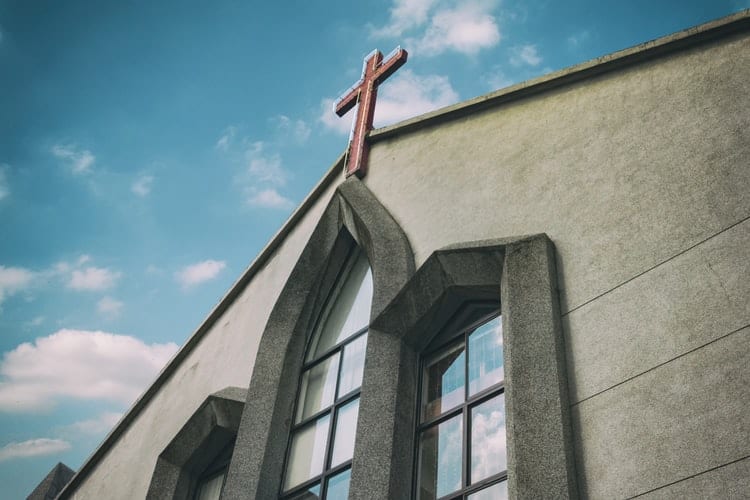Southern Baptist leaders have begun to say publicly what many have been saying privately for months: our denomination is undergoing a time of judgment. In a recent article on his personal blog, R. Albert Mohler, Jr. said, “[T]he terrible swift sword of public humiliation has come with a vengeance.”
Mohler says the judgment facing the Southern Baptist Convention (SBC) results from an “unorganized conspiracy of silence.” He calls the silence “dangerous.” He is right, and this should haunt us. While the silence may be unorganized, it likely reflects habits of complicity deeply embedded in the culture of the SBC.
|
SEBTS photo |
We pray this season of judgment is not the end of our story, but a time when God prunes our convention to restore in us a servant-minded, spirit-empowered unity for gospel cooperation. We pray that this renewal will be followed by seasons of gospel fruitfulness.
But we must become wide awake to the fact that our leadership and organizational dynamics are a determining factor in our cooperative culture.
If the SBC experiences revival in the future, we must begin the active and ongoing preparation to be found revival-ready. That includes preparing for revival through leadership accountability.
Calling for revival is not enough
For many years now, Southern Baptists have voiced our desire for revival to come to our denomination. In preparation for our annual meetings, we often call one another to pray for, seek and generate an expectation for revival. We tell ourselves that revival will come when our desires, affections and wills align with God’s will and character.
These dispositions are necessary spiritual preconditions for revival, but this periodic approach has led us to desire and anticipate revival only in short bursts of spiritual energy.
What happens when revival does not fall as we had hoped? We go about our lives, hoping that it will be different the next time we join our hearts in a fervent longing for revival to come.
My friend Otto Sanchez, pastor of Ozama Baptist Church in Santo Domingo, Dominican Republic and president of the Baptist convention in the Dominican Republic, believes the Lord is planning to revive the churches of Latin America. Every time I am with him, he talks about the work God is doing to prepare the church.
Otto is actively and constantly preparing for this revival in Latin America. He teaches and leads church members and church leaders to instill an anticipation of God’s renewing work. He invests his time in training future leaders. He has inspired a team of people to develop evangelistic and equipping resources to serve Latin American churches. He is discipling a generation of people, and through leadership development and accountability, he is engendering a “revival-ready” culture.
My conversations with Otto have challenged my own thinking on how we should expectantly prepare for revival. We should not anticipate it passively, but actively. We should not pursue it intermittently, but constantly. We should not only seek to cultivate a desire for it, but we should also strategically disciple people in preparation for it.
This leads me to reflect on what the SBC is doing to prepare, and to evaluate just how expectant we actually are. Are we discipling people to have a longing for revival to come to our churches? Are we teaching people to live humble, sacrificial lives that are fully dependent upon God? Are we developing people who esteem personal holiness over ministry success? Are we cultivating spiritual discernment and vision in our people? Are we enculturating commitments, practices and systems to hold our leaders accountable?
In my assessment, Southern Baptists have not been steadfast in our pursuit of humility, sacrifice, faithfulness, holiness and accountability. We have permitted “acceptable sins” to persist among us, and have tolerated behavior by our leaders that would not be tolerated if practiced by those they serve. We have nurtured a culture of silence rather than transparency.
Becoming revival-ready through leadership accountability
The organizational silence in the SBC that Mohler warns about lives and flourishes among our family of churches for one primary reason: we have neglected the responsibility to hold leaders accountable.
There are many reasons for this neglect.
One reason is that Southern Baptists have idolized popularity and influence, and failed to show due honor to local, responsible leaders. Large ministries enable wider reach for gospel impact, and can be used for Kingdom advance. Yet, the adoration of expanding influence can allow unhealthy distance to form between leaders and their communities, and unwittingly blur what would normally be recognized as character flaws and ministry neglect.
Another reason is that we fear losing cultural status and institutional stability more than we fear the Lord. We depend on our storied history of resurgence, the size of our denomination and our contemporary doctrinal fidelity. We are skillful in seeking institutional protection and organizational momentum above all, and these institutional habits judiciously insulate our leaders from accountability.
Further, we have created a culture that discourages confronting leaders, because we’ve stigmatized “those people.” If we are serious about being revival-ready, we have to address this hesitation that too often simply becomes acquiescent silence. We are right not to charge a leader in haste, but this biblical principle (1 Timothy 5:19) is often misapplied to buttress a culture and system that protects its leaders from answering for their responsibilities.
Biblical accountability happens in community and in face-to-face relationships. It calls leaders to live gospel-transformed and biblically faithful lives within and for their community. Such vision and accountability cannot happen without intentional preparation and discipleship.
I have become convinced that one of the greatest current discipleship needs is the equipping of Christians to hold their leaders accountable. Many feel powerless to confront leaders, who are using their gifts and position for personal gain rather the good of the people they are called to serve.
To equip people for this responsibility, we have to cultivate spiritual discernment in them, so that they can perceive when church and denominational leaders use their power and God-given gifts for self-protection and to maintain control. At the end of the day, no matter the institutional influence or public platform, we have to embolden them to fear God and not man.
Our leaders need accountability. However, leaders sometimes deflect it with tactics like patronizing aloofness, aggressive defensiveness and spiritual redirection.
Three questions can help us identify when such ungodly maneuvers are in play. First, how open is the leader to vulnerable accountability and confrontation? Second, how directly do they address their mistakes and ask for forgiveness? Third, what practical steps does the leader take to correct how they lead once they’ve acknowledged that they’ve failed their community? The answers to these questions reveal a lot about the character of a leader.
We talk a lot about leadership, and we do so for good reason. Leadership is essential. But may we not forget that the New Testament focuses its attention on the head of the church, Christ. The church as his body receives its life from the King of kings, and is called to grow, minister and serve under his Lordship.
Christian leaders are gifted to advance the Kingdom of the King and cultivate the flourishing of His people. Christian leaders are called to cultivate this ecclesial reality, but too often they stunt it by trying to be kings themselves, expanding their own kingdom of public influence and recognition.
We need to disciple people to hold their leaders accountable. And we need to disciple leaders who resist the temptation to believe gifts, platform and personality are more valuable than serving the people to whom God has called them.
May God protect His people by giving them spiritual sight to only follow leaders who live for the King and the good of His people. May God give us leaders who have hearts that follow His heart.
I am praying that the Lord will raise up a coalition of leaders who are sincerely humble, godly in character, united in service, share in love for the SBC and see a future for cooperative missions.
Join me in praying for these leaders.
And, join me in preparing our leaders for revival by calling for and practicing a greater level of leadership accountability.
(EDITOR’S NOTE – Keith Whitfield is associate professor of theology, dean of graduate studies and vice president for academic administration at Southeastern Baptist Theological Seminary in Wake Forest, N.C.)

.jpg)

